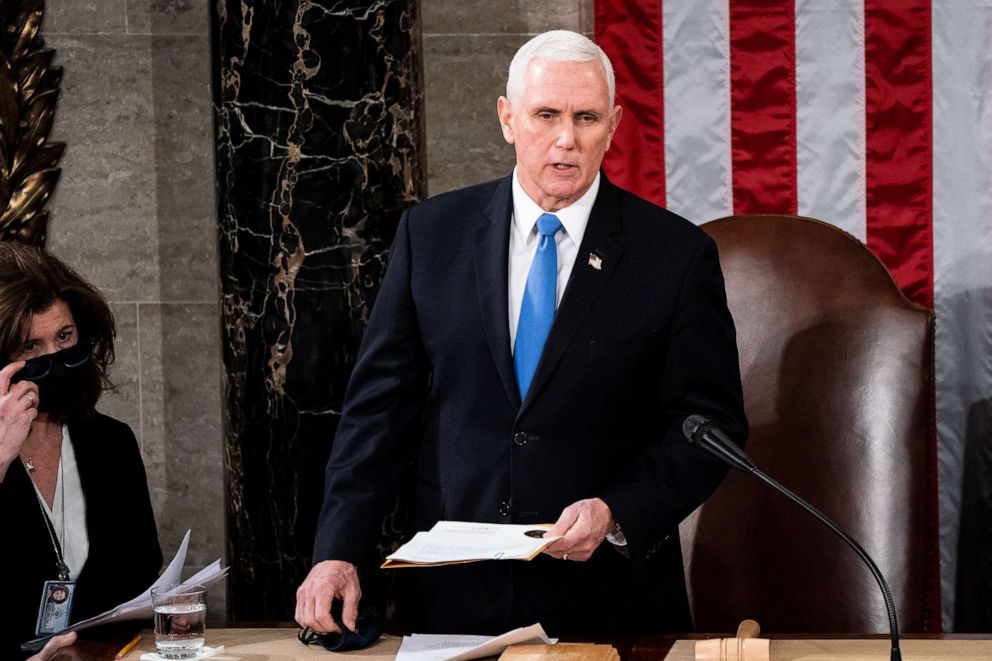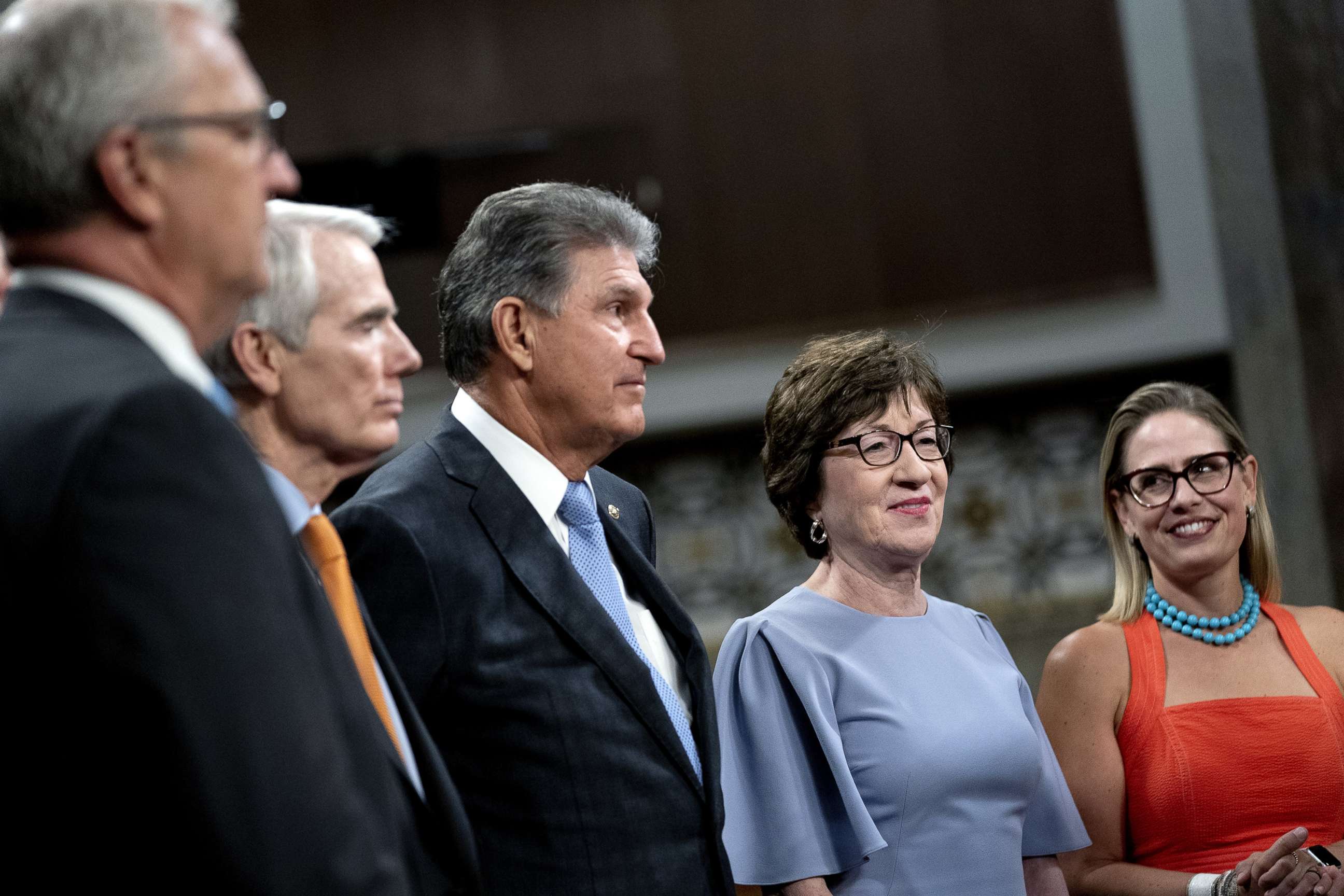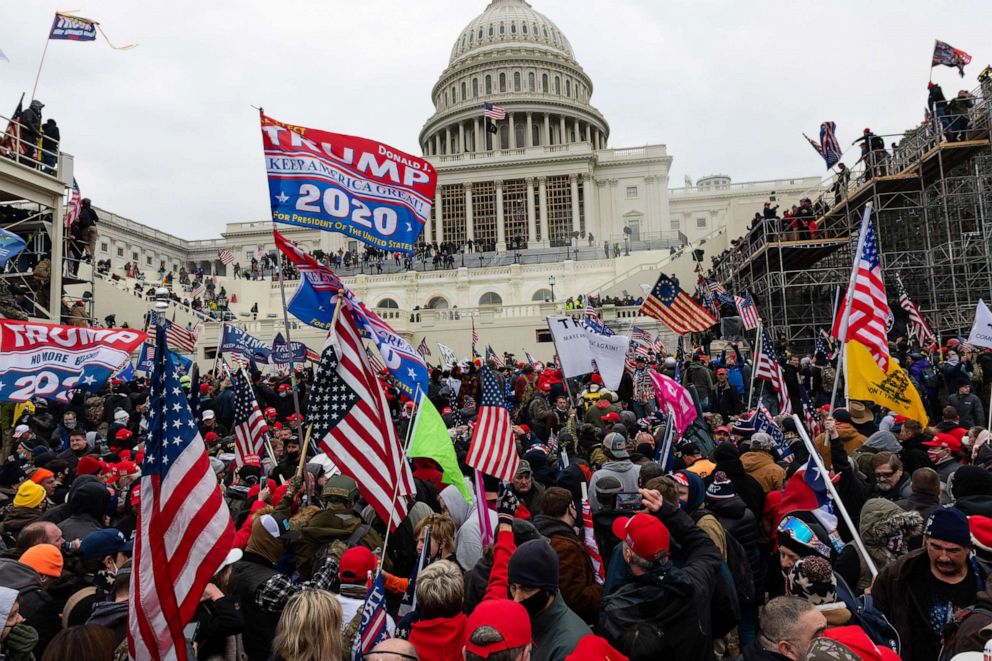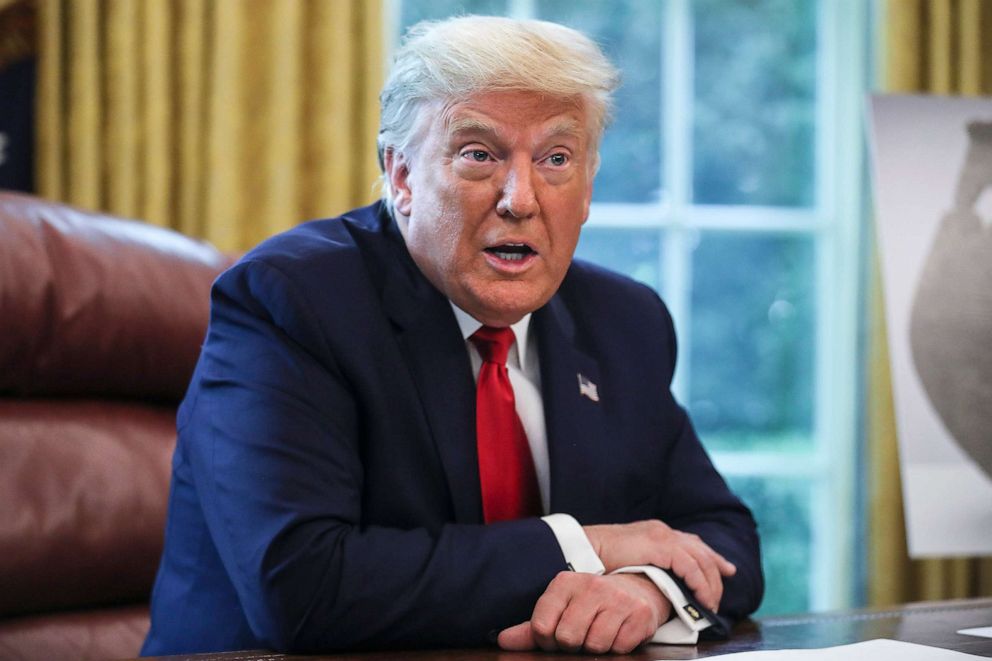Senators reach deal to clarify 1887 law at center of Jan. 6 attempt to overturn election
They want to block any future effort to exploit the law's vagueness.
As the House committee probing the Jan. 6 attack on the Capitol continues to reveal how it says then-President Donald Trump and his allies worked to overturn the 2020 election, a bipartisan group of senators has quietly reached agreement on a sweeping effort to overhaul the very law at the heart of the former president's effort -- the Electoral Count Act of 1887 -- and was set to unveil a bill Wednesday.
The ambiguous 19th century law attempts to prescribe both the process by which the Electoral College selects the president and vice president and how Congress then counts those votes.
The senators hope to address the apparent loopholes and vagueness in the bill, problems laid bare last year on Jan. 6 when Trump's congressional supporters tried to overturn the results in five states that voted for Joe Biden and the committee says Trump attempted to pressure his own vice president to hijack what is normally a ceremonial role in overseeing the certifying of each state's slate of electoral votes, a move that fueled the Capitol insurrection.

The bipartisan group of 16 senators, nine Republicans and seven Democrats, led by Sen. Susan Collins, R-Maine, and including Trump ally Sen. Lindsey Graham, R-S.C., said in a joint statement, "From the beginning, our bipartisan group has shared a vision of drafting legislation to fix the flaws of the archaic and ambiguous Electoral Count Act of 1887. Through numerous meetings and debates among our colleagues as well as conversations with a wide variety of election experts and legal scholars, we have developed legislation that establishes clear guidelines for our system of certifying and counting electoral votes for President and Vice President. We urge our colleagues in both parties to support these simple, commonsense reforms."
The new legislation, the Electoral Count Reform Act of 2022 (ECRA), would enshrine the vice president's "ministerial" role rendering that person powerless to alter the electoral count; dramatically raise the number of congressional objectors required to challenge a state's results to 20%, or one-fifth of members, in both chambers -- a jump from the current requirement of one in each house; clarify that states may not select electors after Election Day; and dictate what happens if an alternate slate of electors is presented to Congress, according to a one-sheet released from the group.
The bill text, according to an aide familiar with the matter, is nearly done and is expected to be released soon.

On Jan. 6, 2021, Vice President Mike Pence ignored the pressure campaign Trump and his allies mounted and certified the electoral totals from each state, but the Senate group in its release states that the bill "affirmatively states that the constitutional role of the Vice President, as the presiding officer of the joint meeting of Congress, is solely ministerial and that he or she does not have any power to solely determine, accept, reject, or otherwise adjudicate disputes over electors."
Additionally, the new legislation seeks to stop any state from sending a false slate of electors, as was part of a plan by Trump's allies in the wake of Joe Biden's win in 2020.
"We define who is the official at the state level for submitting the slate and that is the governor, unless the state law or state Constitution indicates otherwise," Collins told reporters Tuesday, adding that the state "would not be able to change who submits the change (to Congress) after the election."
"Congress could not accept a slate submitted by a different official. This reform would address the potential for multiple state officials to send Congress competing slates," the release states.

The Maine GOP moderate said the bill states that under the Constitution or under federal laws "an aggrieved candidate could bring a lawsuit and challenge any kind of due process challenge, for example, and there would be a process for expedited consideration in the courts."
In addition to those changes to the 1887 law, the Senate group reached back to an 1845 law, the Presidential Election Day Act, to strike what it calls "an archaic" provision "that could be used by state legislatures to override the popular vote in their states by declaring a 'failed election' –- a term that is not defined in the law," the group's release states. Current law states that if electors are not chosen by Election Day in November, states may appoint electors in a manner they choose.
"Instead, this legislation specifies that a state could move its presidential election day, which otherwise would remain the Tuesday immediately following the first Monday in November every four years, only if necessitated by 'extraordinary and catastrophic' events," according to the release.
Sen. Rob Portman, R-Ohio, told ABC News that his portion of the ECRA dealt with the problem that cropped up just days after the 2020 election in which a Trump appointee at the General Services Administration -- a little-recognized federal agency that normally unlocks millions of dollars for office space, equipment, and government staff for a presidential transition -- refused to send a letter recognizing Joe Biden as the president-elect.
That provision "would allow an eligible candidate, during the limited time period in which the outcome of a presidential election is reasonably in dispute, to receive transition resources, removing the need for the Administrator of the U.S. General Services Administration to ascertain the apparent winner during this time," the release states.
The group goes on to define a sole election winner as someone who "receives the majority of pledged electoral votes and there are no further legal or administrative actions pertaining to the results; receives the majority of electoral votes at the meeting of electors in December following the election; or is formally elected at the joint meeting of Congress on January 6."

In addition to the ECRA, a slimmer bipartisan group also introduced the "Enhanced Election Security and Protection Act" to deal with the unprecedented rise in threats against poll workers and other election officials.
This measure would "double the penalty under federal law for individuals who threaten or intimidate election officials, poll watchers, voters, or candidates. Under current law, threats of violence or intimidation against these individuals are punishable by no more than one year in prison. This penalty would be raised to no more than two years in prison," the release states. Additionally, the measure seeks to improve the handling of election-related mail, and -- though there was no widespread evidence of fraud, like voting system tampering, despite Trump's false claims to the contrary -- "increase the existing maximum penalties for individuals who willfully steal, destroy, conceal, mutilate, or alter election records from $1,000 to $10,000 and from up to one year in prison to up to two years in prison. In addition, it would make it illegal to tamper with voting systems," according to the release.
Both parties have, in recent years, sought -- largely through symbolic challenges -- to use the arcane 1887 election law to partisan advantage in what is usually a simple, barely-noticed ceremony of formalities at the heart of a peaceful transfer of power in the U.S, and the legislation introduced Wednesday is also designed to close the door on some of that. Democrats did it in 2001 and 2017 during the joint session of Congress after bitter electoral outcomes that saw their party out of power in the White House.
After the 2020 election, however, Trump and his congressional allies' outsized effort -- without evidence to back their claims of election fraud -- moved Congress to finally act. After a violent, pro-Trump mob stormed the Capitol, the culmination of a months-long effort to reverse the election results, as GOP lawmakers challenged the results of Arizona's vote for Joe Biden, many senators abandoned the effort - though six conservatives, led by Missouri's Josh Hawley, ultimately stuck with it.
Collins' effort began in earnest in January and has included an influential roster in the Senate, from the more consensus-minded, like GOP Sens. Mitt Romney of Utah, Ohio's Rob Portman, and Lisa Murkowski of Alaska, as well as Republicans more supportive of Trump, like Graham, North Carolina's Thom Tillis and Indiana's Todd Young. Democrats, primarily led by Joe Manchin of West Virginia, include Virginia's Mark Warner, Biden ally Chris Coons of Delaware, Arizona's Kyrsten Sinema, and Jeanne Shaheen of New Hampshire.
The participation of Sen. Chris Murphy, D-Conn, a progressive fresh off a major bipartisan win reforming the nation's gun laws, was a surprise to many at first, with a number of participants -- from Republican to Democrat -- eventually expressing admiration for his ability to forge consensus.
"At first, I was really skeptical of Chris' involvement. I thought, 'No way. He's a ringer for (Senate Majority Leader Chuck) Schumer.' But seriously, he was constructive, thoughtful," said one Republican senator who asked to speak on background of the group's deliberations.
The group is aiming to present their work in two parts - with the core of the bill going to the Rules Committee which has jurisdiction over election law.
On Tuesday, that panel's chair, Amy Klobuchar of Minnesota, told ABC News that she planned to hold hearings on the bill and allow her members to consider the legislation and potentially make changes. The rest of the bill would go to the Homeland Security and Judiciary committees.
Senate Republican Leader Mitch McConnell, who strongly rebuked Trump and his fellow Republicans for attempting to stop the orderly transfer of power, said he has kept close tabs on what the group is doing and is "generally supportive." If he were to support the bill, that could have great sway over his conference and give cover to those who might fear a Trump backlash.
Earlier this year, McConnell, R-Ky., told ABC of the Electoral Count Act, "I think it needs fixing, and I wish them well, and I'd be happy to take a look at whatever they can come up with." Asked for any red lines in those negotiations, the leader said, "I just encourage the discussion, because I think (the ECA) clearly is flawed. This is directly related to what happened on January 6th, and I think we ought to be able to figure out a bipartisan way to fix it."
ABC's Gabe Ferris contributed to this report.




